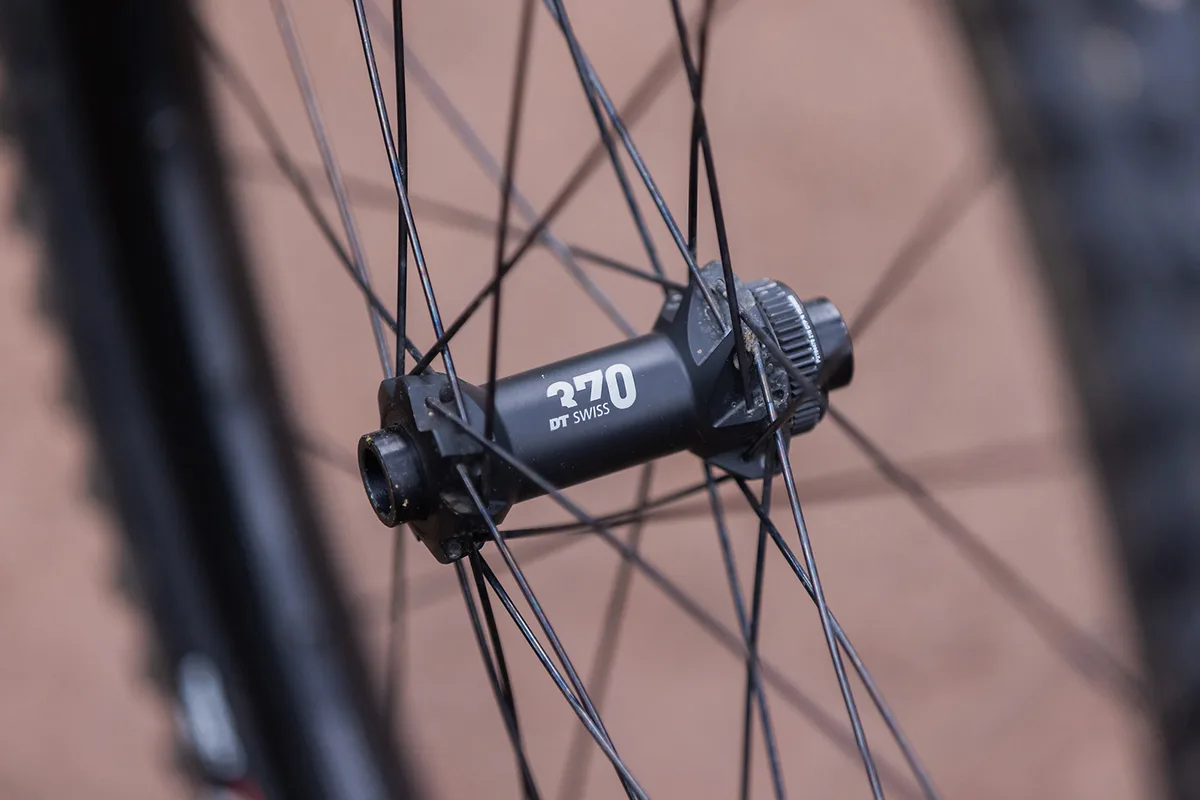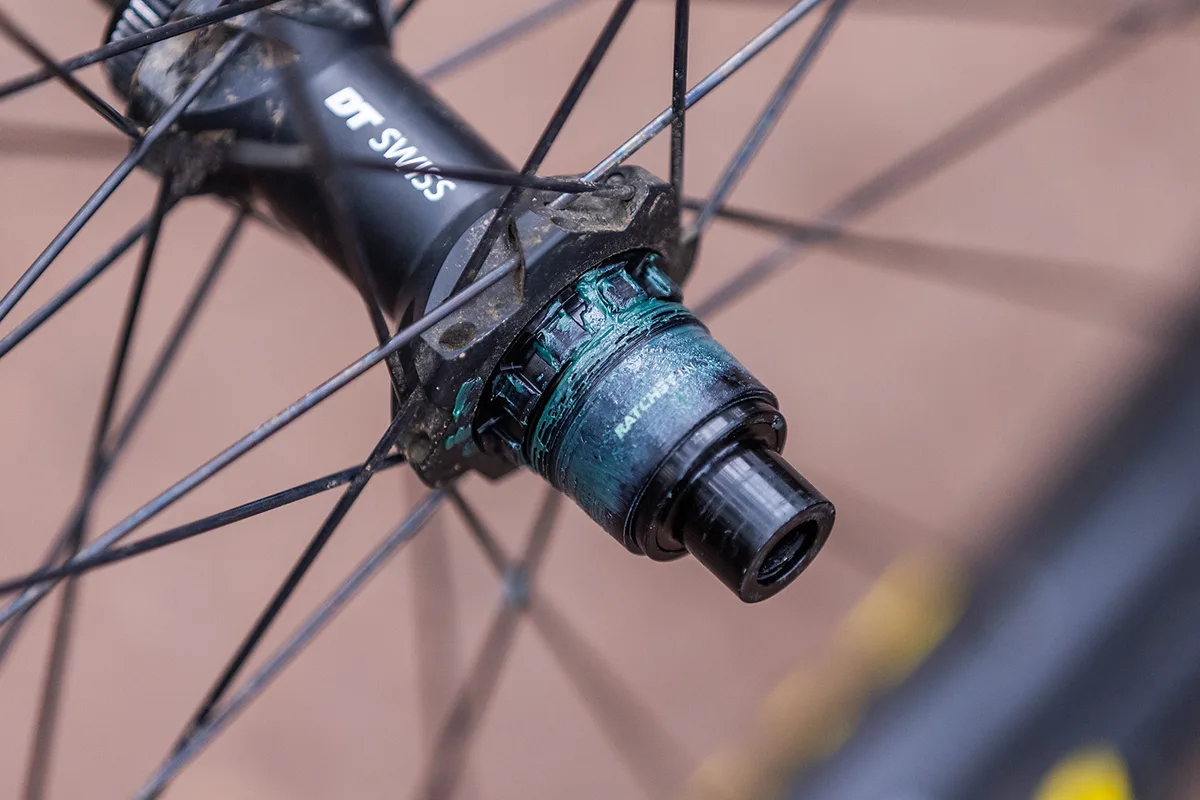The new DT Swiss E 1900 Spline wheelset takes the technology and performance of its pricier EX 1700 and EXC 1501 wheels to crack the performance-versus-price code.
Enduro riders will love the damped and muted feel, and easy-to-service hubs, thanks to the alloy rim construction, sensibly tensioned spokes and pawl-free Ratchet LN 370 hub design.
Weighing 2,170g a pair and costing £449.98 / $660 / €479, they’re impressively affordable for a product emblazoned with the DT Swiss name and the reputation attached to that.
Riders looking to save weight will probably give the E 1900 a swerve, but will have to spend considerably more to do so.
DT Swiss E 1900 Spline wheelset specifications and details

The headline change to the E 1900 Spline wheels is the inclusion of the 370 Ratchet-based hub, which uses the Ratchet LN system.
Functionally, Ratchet LN hubs are identical to the Ratchet EXP and SL hubs used on the 240 and 350 hubs respectively.
This latest model has different seal locations – where they’re fixed to the freehub body rather than the hub body – so pawl freehubs can be upgraded to the LN system.
Ratchet LN hubs have 18 points of engagement, rather than 36 on the 240 and 350, meaning the freehub can rotate by 20 degrees before it engages. This has been increased over the previous E 1900 wheels, which had 24 points of engagement.
The ratchet hub system is claimed to improve reliability over a pawl hub because of a higher engagement surface area increasing maintenance intervals.
That 370 hub is laced using 28 (both front and rear) of DT’s 2mm-diameter Champion spokes to an E532 rim with a 30mm-wide internal section and 35mm external width.
Its shape is identical to the E511 rims used on the EX 1700 wheels, and internally it’s the same width as the rims used on the EXC 1501 wheels.
However, the E532 is sleeve-jointed rather than welded. This method of joining the rim’s ends together to form a hoop uses an aluminium insert within the rim’s cavity to align both ends.

This insert is then bonded, according to DT Swiss, using “structural glue”. It's claimed to be just as strong – and has been awarded an ASTM 4 rating – as welded rims without a significant weight penalty.
The rims come pre-taped and are supplied with tubeless valves, so should be ready for tubeless tyres from the factory.
They’re available in 27.5in or 29in versions and have options for SRAM’s XD Driver or Shimano’s Micro Spline or HG freehub bodies.
The front wheel is only available in 15x110mm Boost spacing, while the rear can be specced in either 12x142mm or 12x148mm Boost widths. Center Lock and six-bolt disc-rotor options are also available.
I tested the 29in 12x148mm Boost Center Lock E 1900 Spline wheels. The test wheels weighed 2,170g (1,028g front, 1,142g rear) on my scales.
DT Swiss E 1900 Spline wheelset performance

I tested the DT Swiss E 1900 Spline wheels on my well-trodden home trails around Scotland’s Tweed Valley, home to some of the UK’s best enduro riding.
I fitted them to my 2024 Marin Alpine Trail XR to test alongside DT’s EXC 1200 Classic enduro wheels.
DT Swiss E 1900 Spline wheelset setup and tubeless inflation

The factory-fitted tubeless rim tape provided an airtight, tubeless seal and required no patching or repairs.
The supplied tubeless valves needed a significant amount of pressure to position them correctly on the rim’s bed.
If they weren't installed correctly, air seeped into the rim’s cavity and leaked out of the rim's nipple eyelets.
It was relatively easy to install a wide range of tyres, with only the toughest DH-casing versions needing tyre levers.
Tubeless inflation was a similarly easy affair, where a high-volume track pump was sufficient to seat most tyres. Only one tyre – a brand new WTB Verdict Light Casing High Grip – required significant airflow and manipulation to seat against the rim’s hook.
Given the isolation of this issue, I don’t feel it indicates a problem with the rim, and it was caused more by the tyre.
DT Swiss E 1900 Spline wheelset on-trail feel

Over rough terrain, whether that was chundery rock gardens or dense, square-edged, root-infested off-cambers, the E 1900s did an impressive job of insulating vibrations and harshness from being transmitted into my hands and the bike’s chassis.
They felt forgiving and supple enough to not get deflected off-line, helping the bike track its designated course, but weren’t so flexible or under-tensioned that steering accuracy was even remotely compromised. I was genuinely impressed by the balance of stiffness and smoothness they offered.
That balance will make them well-suited to a broad range of riders. Hard chargers won’t struggle with vagueness or unwanted flex at high speeds or loads, and lighter or more gentle riders shouldn’t get beaten up by the bump or vibration transfer that stiffer, less forgiving mountain bike wheels are known for.
Their build is impressively quiet too. The spokes didn’t twang or bind together over rough terrain, and neither did the rims dong or bang when faced with harder impacts, further suggesting they’re built solidly but with just enough give.
The 30mm internal width provided plenty of support for tyre carcasses to reduce air burping and squirming in high-load turns, without being too wide and squaring off the tyre’s profile.

The rims have remained ding- and buckle-free during the test period, and if DT Swiss’ historical record is anything to go by, they should remain straight for years to come.
The same level of robustness is true for the hubs and their bearings, despite being tested in some of the wettest conditions I’ve ever experienced.
The 18-point or 20-degree engagement of the Ratchet LN hub could be snappier, but I didn’t feel the free movement made quick half cranks less effective.
The 20 degrees of free movement could be an advantage on some bikes, potentially reducing pedal kickback. That’s because the cassette is allowed to rotate more between its engagement points compared to hubs with fewer degrees of free play, acting similarly to an Ochain chainring.
On technical climbs, a quicker-engaging hub could be beneficial to get the power down sooner, but once I'd got used to the 20 degrees of movement, I didn't notice it negatively impacting performance.
How does the DT Swiss E 1900 Spline wheelset compare?

Compared to DT’s pricier enduro offerings, the EX 1700, EXC 1501 and EXC 1200, there’s little in terms of feel that differentiates them from the cheaper E 1900.
The E 1900 wheels are marginally more forgiving, while the other models in DT’s range – especially the EXC 1501 – better suit heavier riders and hard chargers.
The E 1900s manage to blend stiffness and a lower-tension build to make them suitable for a wider gambit of riders, from beginners to enduro racers.
Weight-wise, in like-for-like comparisons, the E 1900 (2,170g) is only marginally heavier than the EX 1700 (2,023g), but quite a bit heftier than the EXC 1501 (1,752g).
The most expensive, EXC 1200, wheelset weighs 1,814g, which is slightly heavier than the model down. It costs a whopping £2,349.98. But for that extra crash you get an ASTM 5 rating and the most impressive 180 hub with a Ratchet DEG seven-degree engagement freewheel.
Arguably, someone in the market for a £450 wheelset is unlikely to consider the EXC 1501 or EXC 1200, unless they have a moment of folly.
That leaves the EX 1700, which costs £759.98. But is the extra £310 and 147g weight reduction worth it?
For some, the 350 hub’s Ratchet EXP will be a big draw, but the E 1900’s softer feel claws quite a lot of that rationale back and edges them ahead of the next wheels up in DT’s range.
If weight is your driving factor, and money is no object, I can see why spending £1,549.98 on the EXC 1501 wheels will be worth the 418g weight saving, and the upgrade to a 240 hub is a good deal sweetener.
Where would I spend my cash? The price tag, weight and on-trail feel of the E 1900 is hard to ignore.
DT Swiss E 1900 Spline wheelset bottom line

The low asking price, Ratchet hub technology and forgiving ride quality make the E 1900 a seriously appetising prospect.
If you’re focused on reducing your bike’s weight, these wheels won’t be for you. However, they do offer a cash-conscious top-level performance that, in my experience, exceeds their pricier stablemates.
Like the previous E 1900 Spline 30 iteration, DT’s cracked the performance-versus-price code, and improved on it with the Ratchet LN hubs to produce a virtually faultless product that's well deserving of its 4.5-star score.
Product
| Brand | Dt_swiss |
| Price | €479.00, £450.00, $660.00 |
| Weight | 2170g |
Features
| Rim material | aluminium |
| Tubeless compatibility | tubeless_ready |
| Wheel size | 29in_700c |
| Brake type simple | disc |
| Hubs | LN 370 |
| Spokes | DT Champion |
| Rim internal width | 30 |
| Spoke count | 28 |
| Spoke count | 28 |

